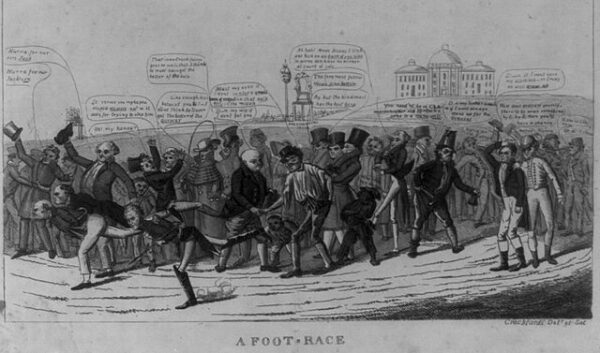On December 1, 1824, the presidential election did something that hasn’t happened since–it was turned over the House of Representatives to choose the president after no one achieved a majority in the Electoral College. That year’s race involved four major candidates: John Quincy Adams, Andrew Jackson, William Crawford, and Henry Clay.
That year, “131 electoral votes, just over half of the 261 total, were necessary to elect a candidate president, explains The History Channel. “Although it had no bearing on the outcome of the election, popular votes were counted for the first time in this election. On December 1, 1824, the results were announced. Andrew Jackson of Tennessee won 99 electoral and 153,544 popular votes; John Quincy Adams of Massachusetts received 84 electoral and 108,740 popular votes; Secretary of State William H. Crawford, who had suffered a stroke before the election, received 41 electoral votes; and Representative Henry Clay of Kentucky won 37 electoral votes.”
The absence of a clear winner in the electoral vote triggered the provisions of the Twelfth Amendment, which stated that in such a scenario, the House of Representatives would choose the president from the top three candidates. The House faced a challenging decision, as each candidate represented distinct factions within the Democratic-Republican Party. John Quincy Adams was a seasoned diplomat and son of the second president, John Adams; Andrew Jackson was a war hero with strong populist appeal; William Crawford was the Secretary of the Treasury; and Henry Clay was the Speaker of the House and a prominent political figure.
Henry Clay, despite finishing fourth in the electoral count, played a pivotal role in the outcome. As Speaker of the House, he held considerable influence and ultimately threw his support behind Adams. This decision proved decisive, as Adams secured the presidency with Clay’s endorsement. After John Quincy named Henry Clay the next Secretary of State, the pair were accused of participating in a “corrupt bargain” by Jackson and his supporters, a label that would stick for centuries.
The controversial circumstances surrounding the election of 1824 proved to be the fuel Jackson needed to in 1828. The famous general spurred by a populist pushback against “the corrupt bargain” led to him riding an electoral wave into the White House, and it all began on this day in 1824.






